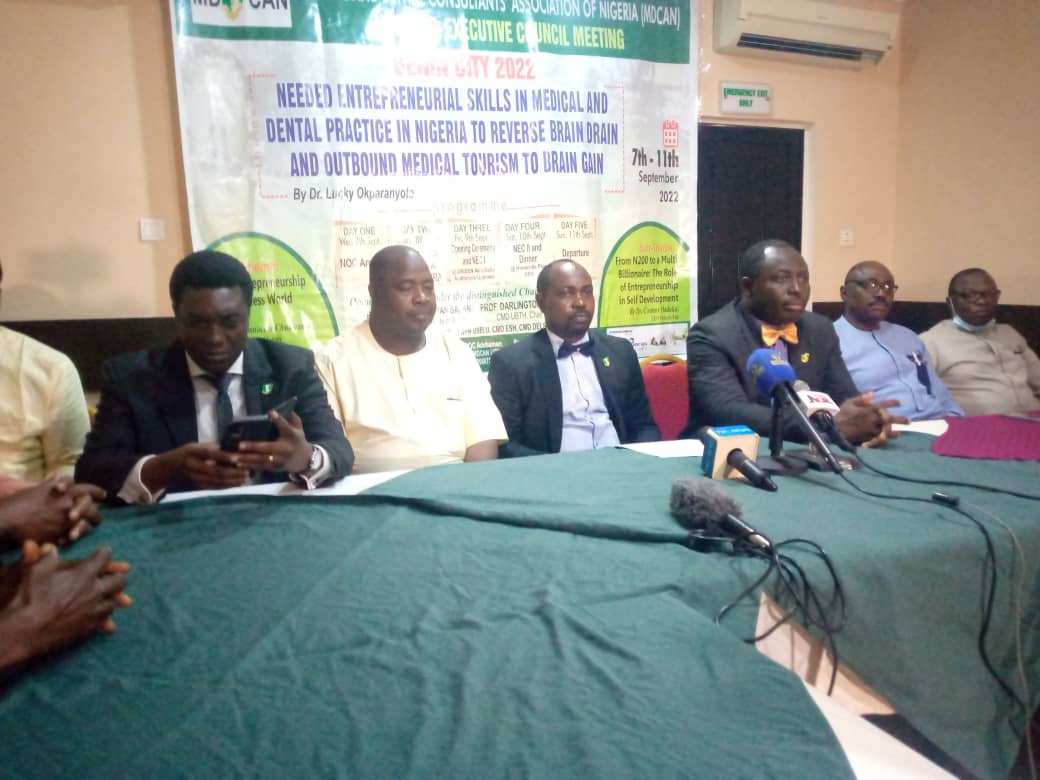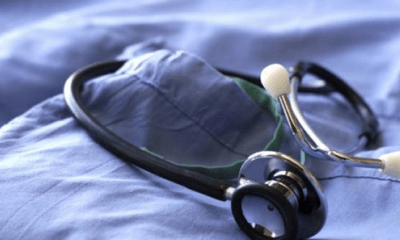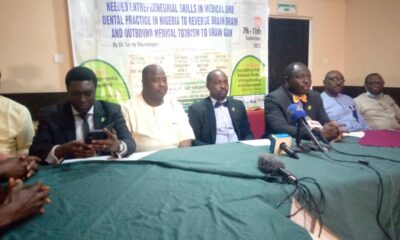Health
MDCAN To Govt: Make Work Environment More Conducive For Health Workers
Published
3 years agoon
By
Editor
The Medical and Dental Consultants’ Association of Nigeria, MDCAN, has urged both state and federal governments to make work environment more conducive for healthcare workers with a view to curtailing mass exodus of healthcare workers to other countries.
MDCAN also appealed to the National Assembly particularly the House of Representatives to “throw away the obnoxious bill seeking to amend the Teaching Hospital Act in its entirety.”
In a communique issued at the end of its National Executive Council, NEC, meeting which held 7th to 11th September in Benin, MDCAN said encouragement of healthcare workers in terms of increment in their salaries as obtainable in other climes of the world, elongation of retirement age of healthcare workers, among others would prevent the migration of healthcare workers to other countries.
The communique issued at the end of the five days NEC meeting in Benin was jointly signed by MDCAN President, Dr. Victor Makanjuola, and its Secretary General, Dr. Yemi Raji, and contained twelve points resolutions.
The five days NEC meeting was themed: ‘Needed Entrepreneurial Skills in Medical and Dental Practice in Nigeria to Reverse Brain Drain and Outward Tourism.’
READ ALSO: NEC 2022: Medical Practitioners Express Worry Over Challenges Facing Health Sector
While lamenting that myriads of problems in the health sector remain largely unresolved by the government, MDCAN in the communique read by its President demanded the “release of relevant circulars correcting the retirement age of hospital consultants by government.”
The Association further demanded that “the depressing shortfalls in the salaries of the honorary consultants who are clinical lecturers be corrected immediately,” saying that it cannot guarantee industrial harmony in government hospitals if the demands to address such shortfalls are not met within two weeks.
While calling on well meaning Nigerians to intervene, in order avert impeding crisis in the health sector, should such shortfalls are not corrected, MDCAN further urged “relevant government agencies to remove all obstacles hampering the placement of house officers to public hospitals and make the process seamless.”
Condemning efforts by allied professional bodies to encroach into core areas of medicine, through attempt to establish residency programmes in purported ‘clinical aspects,’ MDCAN dissociated itself from the so called residency training programmes for non doctors, and called on relevant government agencies to be wary of dangers such act portends.
Commenting on 21 days ultimatum issued by Nigerian Medical Association, NMA, to Abia State Government over non payment of doctors’ salaries for the past 24 months, MDCAN threw it weight behind its sister association and urged it members to “key into all actions by the NMA to compel the Abia State Government to resolve the crisis with doctors.”
READ ALSO: Election: Edo NMA Branch Unveils New Executives
The Association further added: “MDCAN is totally in support of the NMA demands for government to address ALL issues related to the approved hazard allowance, within two weeks.”
On university Lecturers’ strike, the Association urged government to “intensify efforts at revolving the Impasse in the government’s negotiation with ASUU, towards immediate resolution of all outstanding issues, in order to end the ongoing strike.”
You may like


Japa: Only 6,000 Medical Consultants Remain In Nigeria -MDCAN


‘Japa’ Syndrome: Departments In Teaching Hospitals Shutting Down, MDCAN Raises Alarm


BREAKING: MDCN Suspends Four Doctors From Medical Practice


NMA, NERD, Others React To UK Restriction Of Doctors’ Migration


Full Text: Communique By Medical And Dental Consultants’Association Of Nigeria
Health
LASG FLags Off Polio Outbreak Response Campaign
Published
6 months agoon
January 20, 2025By
Editor
The Lagos State Government, through the Lagos State Primary Health Care Board, has launched the 2025 Polio Outbreak Response Campaign, reaffirming its commitment to eradicating polio and safeguarding the health of its children.
The ceremony, held at the Simpson Primary Healthcare Centre, was led by the First Lady of Lagos State, Dr. (Mrs.) Claudiana Ibijoke Sanwo-Olu, represented by Mrs. Widad Jumoke Mustafa, a member of the Committee of Wives of Lagos State Officials (COWLSO).
In her address, the First Lady emphasised the state government’s proactive measures to keep Lagos polio-free, highlighting the critical importance of the campaign in preventing the debilitating effects of poliomyelitis, which can result in paralysis or death.
READ ALSO: IMPEACHMENT: Lagos Ex-Speaker, Obasa’s ‘Sins’ Revealed
The First Lady also called on parents, community leaders, and stakeholders to support the campaign by ensuring eligible children are vaccinated.
Targeting children aged 0-59 months, vaccination teams will administer the Oral Polio Vaccine (OPV) to prevent virus transmission.
Dr. Kemi Ogunyemi, the Special Adviser on Health, expressed gratitude to Lagosians for their continued cooperation in the fight against polio. While appreciating all healthcare workers and partners for their services, Mrs. Ogunyemi encouraged parents to present their children and wards for the exercise.
Also speaking, the Chairman of Lagos Mainland Local Government, Mrs. Omolola Rashidat Essien opined that Immunization is key in ensuring that children are kept safe from polio and other vaccine preventable diseases.
Dr. Abimbola Bowale, the Supervising Permanent Secretary, Lagos State Primary Health Care Board, who also spoke at the event, underscored the life-saving importance of immunization.
“All children aged 0-59 months need multiple doses of the polio vaccine to ensure full protection. Any child missed represents a potential risk for the poliovirus to spread. The vaccine is safe, effective, and crucial in keeping our communities polio-free,” he stated.
Dr. Bowale also outlined several strategies to ensure the success of the campaign, including fixed post teams stationed at primary healthcare centres and public health facilities, house-to-house visits, and a transit strategy to reach special locations such as places of worship, schools, motor parks, and other public venues.
The event concluded with Dr. (Mrs.) Claudiana Ibijoke Sanwo-Olu officially launched the campaign, marking a renewed effort to maintain Lagos State’s polio-free status.

The Lagos state suspected cholera cases have risen to 421.
The Commissioner for Health, Akin Abayomi disclosed this on his Instagram handle @profakinabayomi on Saturday.
“As of June 20, 2024, an additional four suspected cholera cases have been reported, as illustrated in the accompanying graph,” he wrote.
He noted that the Emergency Operations Centre in collaboration with all relevant partners is actively engaged in contact tracing, community-based surveillance, awareness campaigns, sample testing, and ensuring that confirmed cholera cases receive appropriate medical treatment.
READ ALSO: Two Suspects Arrested For Stealing Car From Mosque During Juma’at Prayer
On Friday, the commissioner confirmed 35 cases out of the 417 suspected cases and 24 deaths across 20 Local Government Areas in the state.
The cases were reported from Agege, Badagry, Ikeja, Mushin, Ajeromi-Ifelofun, Epe, Ikorodu, Ojo, Alimosho, and Eti-Osa.
Others were Kosofe, Oshodi-Isolo, Amuwo-Odofin, Ibeju-Lekki, Lagos Island, Shomolu, Apapa, Ifako-Ijaiye, Lagos mainland, and Surulere.
Cholera is a food and water-borne disease caused by ingesting the bacteria— Vibrio cholerae — in contaminated water and food. Cholera can cause severe acute watery diarrhoea, and the severe forms of the disease can kill within hours if left untreated.
In Nigeria, cholera is an endemic and seasonal disease, occurring annually mostly during the rainy season and more frequently in areas with poor sanitation.
READ ALSO: Police Arrest 28yr Old Suspected Cultists, Recover Gun In Delta Community
The World Health Organisation on Thursday announced a spike in cholera in several regions of the world, with almost 195,000 cases and over 1,900 deaths reported in 24 countries since the start of 2024.
WHO said the Eastern Mediterranean Region reported the highest number of cases, followed by the African Region, the Region of the Americas, the Southeast Asia Region, and the European Region.
The global health body, however, noted that there are no reported cases in the Western Region, according to its bulletin released on Wednesday.
It said it exhausted its global stockpile of Oral Cholera Vaccines by March but was able to exceed “the emergency target of five million doses in early June for the first time in 2024.”

By Silver Yeibake
Autism, commonly known as Autism Spectrum Disorder (ASD), is a neurodevelopmental disorder that affects communication, social interaction, and behavior. Autism is referred to as a spectrum condition since it can manifest in a variety of symptoms and abilities. While the actual cause of autism is unknown, evidence suggests that genetic and environmental factors interact to influence its development.
The risk factors include a sibling with autism, advanced age of parents, exposure to certain air pollutants and pesticides before birth, extreme prematurity, mothers with diabetes, immune system disorders or obesity, any difficulty with delivery leading to deprivation of oxygen to the baby’s brain, fever during pregnancy, lack of certain vitamins minerals during pregnancy, and certain genetic conditions, such as Down, fragile X, and Rett syndromes.
“Risk factors can not on their own cause a disease. However, they can increase the likelihood of that disease in a person.”
It is important to know that contrary to trending claims online, there is no scientific or medical evidence that vaccines or consumption of sugar are risk factors for autism.
READ ALSO: Kidney Stones: What You Need To Know
Autism is defined by difficulties in social interaction and communication. Individuals with autism may struggle to grasp social cues, maintain eye contact, and engage in typical back-and-forth conversations. Some people may also engage in meaningless, repetitive actions, such as hand-flapping or rocking, and have strong interests in specific areas.
It is essential to remember that autism is a lifelong diagnosis, but with early intervention and adequate care, people with autism can live fulfilling lives.
Autism treatment frequently includes behavioral therapy, speech therapy, occupational therapy, and social skills training. Each individual with autism is unique, thus interventions should be tailored to meet their personal needs and strengths.
In spite of the difficulties that autism can cause, many people with autism possess unique talents and abilities. Some people may succeed in fields such as music, art, mathematics, or programming, thus it is important for society to acknowledge and honor the qualities and achievements of people with autism.
In summary, autism is a complicated and diverse disorder that affects individuals in various ways. By raising autism knowledge, understanding, and acceptance, we can build a more inclusive society in which people with autism can thrive and attain their full potential.
Dr. Yeibake, Weriwoyingipre Silver.
Senior Registrar,
Faculty Of Pediatrics,
WACP
- Osun Monarchs Donate Air-conditioners, Computers To Support NUJ’s E-Library Project
- Man Seeks End Of 16 Years Wedlock For Lack Of Love
- Coalition: Why Tinubu Must Not Sleep —Primate Ayodele
- My Wife Goes Clubbing At Will, Cares Less That She’s Childless, Man Tells Court
- I Ran For My Dear Life After My Wife Threatened To Bathe Me With Acid — Husband
- My Husband Leaves Home Whenever We Have Misunderstanding, Woman Tells Court
- 2Face Controversy: Family, Friends Speak Out Amid Apology Backlash
- Burna Boy Turns 34, Reveals Plans To Start A Family
- Cultism: Edo Police Arrest Suspected Killer Of Three Vigilantes, 15 Others
- My Wife Abandoned Me, Deserted Home For Three Months —Husband
About Us
Trending

 Sports2 days ago
Sports2 days agoBREAKING: Liverpool Star Diogo Jota Is Dead

 News4 days ago
News4 days agoSenator Withdraws From Legislative Duties Over Health Challenge

 Politics4 days ago
Politics4 days agoINEC Unveils 2025-2026 Election Timetable, Resumes Voter Registration

 Headline4 days ago
Headline4 days agoUS-based Lawyer Becomes First Nigerian To Travel To Space

 Politics3 days ago
Politics3 days agoEdo: S’Court Reserves Verdict On Ighodalo’s Case Against Okpebholo

 Headline4 days ago
Headline4 days agoTelevangelist, Jimmy Swaggart, Is Dead

 Metro4 days ago
Metro4 days agoCleric Jailed 53 years For Sexually Assaulting 14-year-old Daughter

 News4 days ago
News4 days agoCAC Unveils AI-powered Portal For 30-minute Company Registrations

 Metro3 days ago
Metro3 days agoControversy Over Pregnant Woman Buried Alive In Edo

 Headline3 days ago
Headline3 days agoAU Helicopter Crashes In Somali Capital – State Media

























